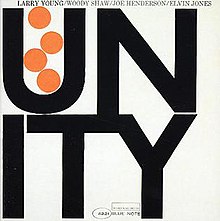Unity (Larry Young album)
| Unity | ||||
|---|---|---|---|---|
 |
||||
| Studio album by Larry Young | ||||
| Released | August 1966 | |||
| Recorded | November 10, 1965 | |||
| Studio |
Van Gelder Studio Englewood Cliffs |
|||
| Genre | Jazz | |||
| Length | 40:02 | |||
| Label | Blue Note | |||
| Producer | Alfred Lion | |||
| Larry Young chronology | ||||
|
||||
| Professional ratings | |
|---|---|
| Review scores | |
| Source | Rating |
| Allmusic | |
| Penguin Guide to Jazz | |
Unity is an album by jazz organist Larry Young, released on the Blue Note label. While not free jazz, the album features innovative experimentation. The title was chosen by Young because "although everybody on the date was very much an individualist, they were all in the same frame of mood. It was evident from the start that everything was fitting together." The album was Young's second for Blue Note, following on from Into Somethin'.
Three of the six tracks were composed by Woody Shaw. The first, "Zoltan", starts with part of a march from the Háry János suite of Zoltán Kodály and continues in the Lydian mode. The second, "The Moontrane", is dedicated to John Coltrane, "as can be heard in the harmonic cycles in it", explained Shaw. The third, "Beyond All Limits", has a difficult harmonic progression, but, in Shaw's words, "once the inherent difficulties of the tune are solved, there are no limits as to where you can go with it". "If" is a 12-bar Joe Henderson composition; "Monk's Dream" (played only by Young and drummer Elvin Jones) is by Thelonious Monk; and "Softly, as in a Morning Sunrise" is a Hammerstein & Romberg composition.
Drummer Elvin Jones played "a standard 4-piece drum kit with two cymbals and hi-hat".
Scott Yanow states that Unity "is considered Larry Young's finest recording".Billboard Magazine called the album "a sureshot for jazz fans".The Penguin Guide to Jazz awarded it a rare crown and four-star rating, describing it as "Quite simply a masterpiece." Also, saxophonist Michael Brecker referred to the album as a favourite of his.
...
Wikipedia
